IRGC-Linked Website Calls Reports Of US Terror Warning To Iran 'A Lie'
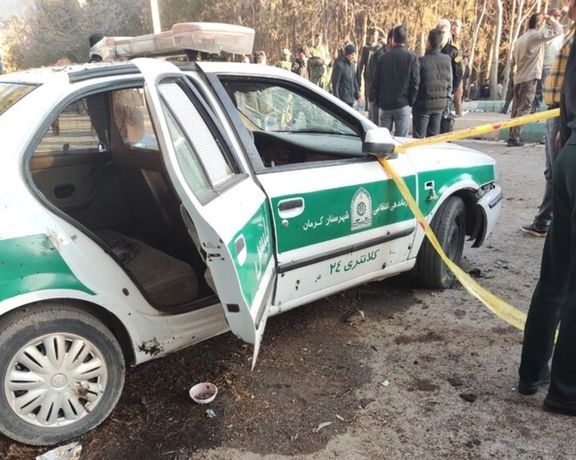
Fars news agency, affiliated with the IRGC, dismissed reports claiming Washington warned Tehran prior to recent bombings by ISIS in Iran.

Fars news agency, affiliated with the IRGC, dismissed reports claiming Washington warned Tehran prior to recent bombings by ISIS in Iran.
The Wall Street Journal reported on Thursday that the US had warned the Islamic Republic of the impending bombings which claimed the lives of 95 people in Kerman earlier this month.
There are “compelling reasons” which demonstrate that such claims, made by the Wall Street Journal and repeated by American and British media, counter “the facts on the ground,” Fars wrote on Saturday.
On Friday, IRNA, the Iranian state news agency, also rejected the reports of Washington’s terror warning to Tehran.
Even the White House officials, including Deputy US State Department Spokesperson Vedant Patel, have refused to confirm the Wall Street Journal’s report, Fars added.
The Fars website further reiterated the usual rhetoric of the Islamic Republic, accusing the US of establishing ISIS and supporting “terrorist and subversive groups” in Iran.
Islamic State’s affiliate in Afghanistan, ISIS-Khorasan, known as ISIS-K, committed the attacks at the commemoration ceremony of slain Qods Force commander Qassem Soleimani.
Separately, Iran International has learned that the US passed the warning to Iran more than one week before the attack.
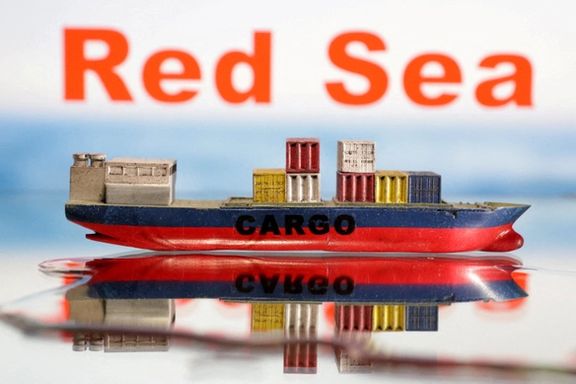
Iran-backed Houthis have claimed responsibility for a missile attack that set a British oil tanker on fire in the Gulf of Aden Friday night local time.
“In vindication of the oppressed Palestinian people, and in response to the American-British aggression against our country, Yemen naval forces targeted the British oil ship (Marlin Luanda) in the Gulf of Aden,” a spokesperson for the group said in a televised statement. “The strike was direct, and resulted in the burning of the vessel, by virtue of Allah.”
Shipping data suggests the Marlin Luanda was heading towards Singapore under the flag of the Marshall Islands. It was hit by a missile 60 nautical miles southeast of Aden in Yemen, according to UK Maritime Trade Operations.
Reports suggest the tanker is carrying Russian naphtha. This fully contradicts Houthi claims that they target vessels bound for Israel of linked to Israeli interests.
This is the most serious Houthi attack since they began their war on ‘Israel-related’ vessels last October, in support of Palestinians in Gaza. That campaign now seems to have broadened to include British or American related vessels –both commercial and military.
Earlier Friday, the Houthis had fired an anti-ship missile toward USS Carney. That missile was successfully shot down, according to the US Central Command.
The Houthis seem adamant to carry on with their attacks in the face of US (and UK) airstrikes that started earlier this month.
Their leader Mohammad Ali al-Houthi posted an open letter to President Joe Biden Friday, claiming that the group’s target was only “Israeli navigation” not international navigation. “Why not tell your people that 4874 ships have crossed the Bab el-Mandeb and Suez Canal back and forth during the Yemeni naval operations,” he asked in a rare English post on X.
This recent attack comes amid reports that China has called on Iran to rein in the Houthis.
"Basically, China says: 'If our interests are harmed in any way, it will impact our business with Tehran. So tell the Houthis to show restraint'," Reuters quoted an Iranian official speaking on condition of anonymity.
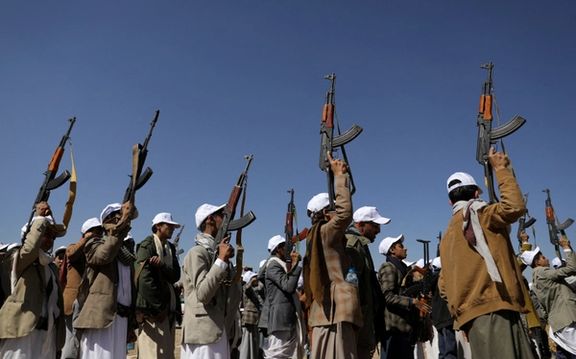
China no doubt enjoys some leverage over Iran. It’s unclear, however, if Iranian regime is willing to give up its most important leverage against the US, while it is unable to render any direct assistance to its ally, Hamas, as Israel continues to hammer at the group.
The attack on a British oil tanker suggests that the Houthis don’t mind further escalation of the conflict. This is at odds with the wishes of the United States and its allies. Iran and its Yemeni proxies are playing a game of brinkmanship up to the point of direct confrontation with the US.
The Iranian regime and its regional proxies have been engaged in attacks on the US and its allies almost daily since the start of the Israeli onslaught on Gaza. And the Biden administration has so far not found a way to force a change of course.
Some Biden critics say the airstrikes against Houthis in Yemen is “too little too late”, and that nothing short of a “direct hit” against Iran would bring about his desired outcome.
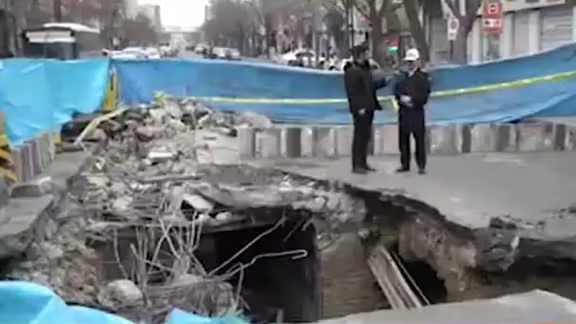
An area of about 200 square meters collapsed on Friday morning in one of the major streets in Iran’s capital city Tehran.
Officials have attributed the incident to land subsidence.
According to reports, the incident took place at the beginning of Kargar Street on the northern side of Qazvin Square in central Tehran.
As the asphalt of the floor of the street collapsed, the remains of an old public bathroom and toilet were found. No information has been released yet regarding the age and history of the discoveries.
The incident resulted in the closure of the street and the disconnection of water and electricity in the area for several hours.
Over the past years, land subsidence has turned into a serious crisis in various parts of Iran.
Experts warn that the current land subsidence situation in Iran puts the lives of more than 39 million people at risk.
Several factors have caused the situation to reach breaking point, including dam construction, climate change, inefficient water consumption by agriculture and industries, and the use of underground aquifers as sources for illegal agricultural water extraction wells.
In March 2023, Ali Beitollahi, heading the disaster task force on the issue at the Road, Housing and Urban Development Research Center of Iran, said the approximate area of subsidence zones in the country has reached 18.5 million hectares, almost 11% of Iran’s total area.
Back in August, Iran International obtained documents revealing that the Islamic Republic officials were aware of dangerous land subsidence but were unwilling to share it with the public.
According to a leaked confidential letter from Iran’s National Cartographic Center, about 550 square kilometers of land in and around Tehran (about the size of the UK city of Manchester or the US city of El Paso, Texas) is sinking an average of over 13 centimeters (about 5.12 inch) per year.

Iranian Peace Nobel Laureate Shirin Ebadi has urged a top UN human rights official to cancel her visit or meet with those on death row during her stay in Iran.
Nada Al-Nashif, UN Deputy High Commissioner for Human Rights, is scheduled to arrive in Tehran on February 3 to investigate executions and women’s rights violations.
In a message addressed to Al-Nashif on her Instagram Thursday, Ebadi pointed out that at least four prisoners including a protester, Mohammad Ghobadlou, and a Kurdish political prisoner, Farhad Salimi, were executed in one week after unfair trials and in violation of the Islamic Republic’s own laws just ahead of her visit to Iran.
Ghobadlou who had just turned twenty-four was hanged despite his death sentence being overturned by the Supreme Court which ordered a branch of Tehran Criminal Court to retry the case. Carrying out a death sentence despite such a ruling was unprecedented.
Ebadi recommended to Al-Nashif to cancel her visit in protest to “extra judicial and increasing executions to prevent the regime from taking advantage of it and using it for propaganda.
Ebadi also recommended Al-Nashif not to wear a headscarf, as Iranian authorities demand female foreign visitors to do, and to meet and talk with ordinary people alongside meetings with government officials.
“Visit Evin prison and talk with some of the women who are on hunger strike, including [2023 Peace Nobel Laureate] Narges Mohammadi, and the family of Mahsa Amini who was killed by government agents in September 2022 because of her hijab, and with several prisoners who are on death row such as Mujahid Korkur, among others, so that a fuller picture of the deplorable conditions of human rights [in Iran] is shown to you,” Ebadi wrote.
Another post on Ebadi’s Telegram channel Thursday about UN High Commissioner for Human Rights Volker Türk’s expression of concern over the spike in the use of death penalty in Iran, said “Expressing concern is not enough.”
The Islamic Republic which has the highest rate of executions in the world after China has executed 90 people just during December 22-January 21 this year.
Sixty-one female prisoners at Tehran’s Evin Prison from various political backgrounds including Nobel Peace Laureate Narges Mohammadi staged a one-day hunger strike Thursday in protest to the regime’s increasing use of executions including those of political prisoners.
Some activists in Iran and abroad including dissident rapper Toomaj Salehi and pop singer Mehdi Yarrahi, some of the families of prisoners, and political prisoners, including Zeynab Jalali who is serving a life sentence at Yazd Prison, have joined the hunger strike in solidarity with the prisoners at Evin.
Türk said in a statement on Wednesday that he is alarmed by the sharp spike in use of the death penalty in Iran including the two execution last Sunday. “This practice must be stopped immediately,” he said.
UN experts on January 21 also strongly condemned these recent executions and expressed serious concern at credible reports that those executed had been denied access to lawyers during their detention and trial.
The mothers of four death-row political prisoners -- Mohsen Mazloum, Pezhman Fatehi, Vafa Azarbar, and Hazhir Faramarz – have also pleaded with Al-Nashif to urge Iranian authorities to halt the impending execution of their sons as well as other prisoners on death row.
The hashtag #NoToExecution has been trending among Iranian social media users following the announcement of the hunger strike and a tweet storm on Monday has been announced.
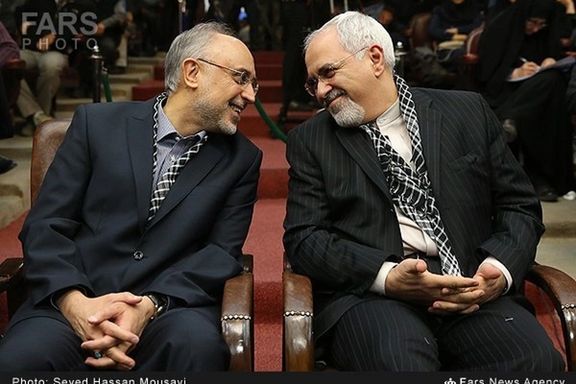
Iran’s former foreign minister Ali Akbar Salehi stressed that Tehran will “never” recognize Israel “even if a Palestinian state is established.”
“As long as the [Israeli] entity exists and is active in our region, the crisis will remain between Iran and the regime that is occupying Jerusalem, even if a Palestinian state is established. I am referring to the proposed two-state solution,” Salehi said in an interview with Russia Today.
The Iran-Israel conflict will end only when the latter “ceases to exist,” he pointed out, further noting that “the form and means of this confrontation may change, according to the circumstances of time and place.”
The two-state solution to the Israeli–Palestinian conflict envisions an independent State of Palestine alongside the State of Israel, west of the Jordan River.
The boundary between the two states is still subject to dispute and negotiation, with Palestinian and Arab leadership demanding full Israeli withdrawal from territories it occupied in 1967, which is rejected by Israel.
In 2015, Supreme Leader Ali Khamenei said Israel must be destroyed in 25 years and the government even set up a countdown clock in Tehran and a few other cities. Many Iranians mock the anti-Israel rhetoric and the ticking clock, but the regime is adamant in pursuing the goal.
Regime authorities use every opportunity to stress the necessity of “Israel's destruction,” a slogan that has justified Iran’s huge financial and military support to militant groups such as Hamas and Hezbollah, while Iranians increasingly face poverty and a bleak economic future.

Yemen’s Houthis launched a missile attack against the USS Carney, an Arleigh Burke-class guided missile destroyer, in the Gulf of Aden.
The US Central Command (CENTCOM) announced in a post on X that the Iran-backed militant group fired an anti-ship missile to target the warship at 1:30 p.m. (Sanaa time) on January 26.
The USS Carney intercepted and shot down the projectile, CENTCOM reported, further adding that the infrastructure and the forces sustained no damage or injury in the attack.
Though the Iranian regime has avoided any direct involvement in the Gaza war, Tehran has used its proxy groups in the region such as Houthis and Hezbollah to attack Israeli and American targets.
Yemen’s Houthis in particular, have disrupted regional stability and international trade by targeting shipping lanes in the Red Sea, the Gulf of Aden, and the Bab el-Mandeb Strait.
The group claims they only target Israeli and Israel-bound ships. Their campaign began after Iran’s Supreme Leader Ali Khamenei in early November urged Muslims to initiate a blockade of Israel.
Citing regional and Iranian sources, Reuters reported last week that commanders from Iran’s IRGC and Lebanon’s Hezbollah are in Yemen helping to direct Houthis’ attacks in the Red Sea.
In December, the United States launched a multinational naval coalition in the Red Sea to protect trade vessels. According to Reuters, 20 countries, including Britain, Norway, Seychelles, France, the Netherlands, Australia and Italy, have joined the coalition.
On January 10, the UN Security Council passed a resolution, calling on the Houthis to stop attacks on shipping immediately.
Two days after the resolution was approved, the US and UK targeted dozens of Houthis’ sites in Yemen.